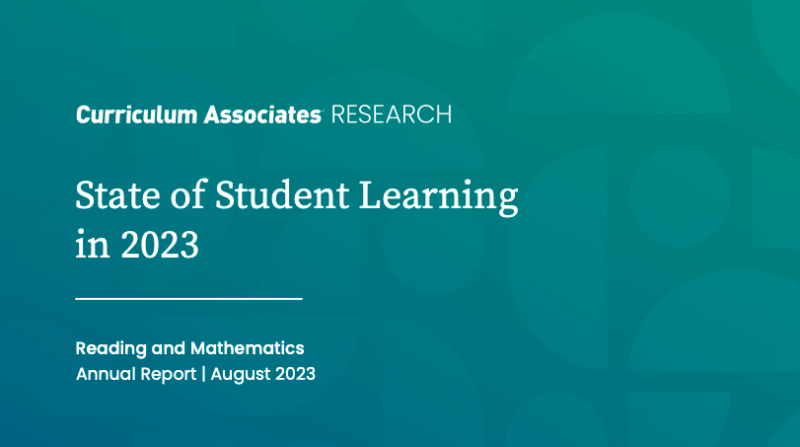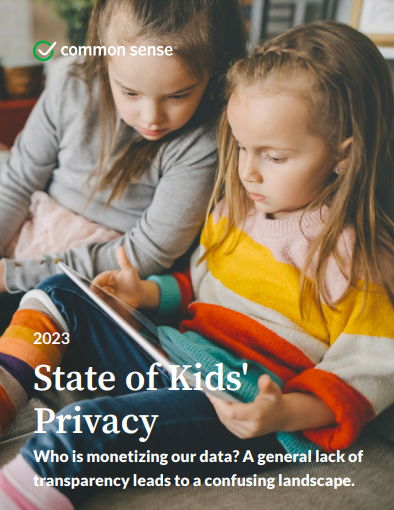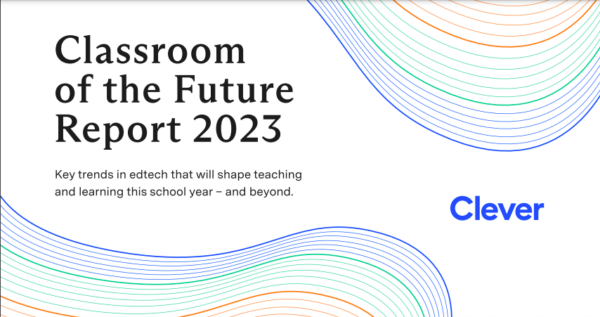Clever, the platform used by more than 75% of U.S. K-12 schools to simplify and secure digital learning, announced last month its Classroom of the Future Report 2023, a new survey of school administrators, teachers, and edtech vendors highlighting five trends shaping classrooms of the future.
According to the data, almost two-thirds of teachers (63%) reported that edtech has been key in lightening their workloads, underscoring its ongoing role in supporting teacher wellness. Moreover, while 68% of teachers said efficiency gains are edtech’s main advantage, even more administrators (74%) attributed its impact on teacher effectiveness – the ability to successfully educate and engage students.
“Edtech applications provide teachers with insights into student progress, identifying their student’s needs and in many cases offering supplemental resources – a significant relief for teachers and a major support for struggling students,” said Mark Choi, Instructional App Specialist of Bellevue School District.
These findings highlight edtech’s multifaceted benefits in streamlining daily tasks and freeing up teachers’ time to focus on what truly matters: enhancing student learning, especially for diverse learners with varied needs. Other key findings from the report, which features perspectives from more than 1,000 teachers and 500 administrators, include:
+ Majority of teachers need support for personalized learning and diverse learners: Almost 70% of teachers and 50% of administrators call for more edtech support for students with IEPs or 504 plans. Moreover, concerns abound about the availability of products effectively serving diverse learners, as reported by 56% of teachers and 59% of administrators.
+ Students’ acceptance of edtech surpasses expectations: In contrast to initial pandemic apprehension, 79% of teachers and 89% of administrators report sustained or more positive student attitudes toward edtech over the past year, with many teachers and administrators simultaneously reporting an increase in overall usage of these tools.
The report, based on a survey conducted in Spring 2023, also unpacks previously released results on the impact of artificial intelligence (AI) in education, which found that while 85% of teachers and 78% of administrators believe AI will significantly influence teaching, concerns about job complexity and a lack of preparedness remain high.
“Edtech is here to stay, and the rise of AI will have an inevitable impact on the future of teaching and learning,” said Trish Sparks, CEO of Clever. “As we look ahead, edtech that addresses the needs of all students, while also helping teachers navigate evolving classrooms, will have the most impact.” To learn more, read the full report here.
Curriculum Associates has released its newest annual report, State of Student Learning in 2023: Academic Recovery Remains Slow in Most Grades, which demonstrates that little progress has occurred since the beginning of the pandemic, and even students in Grades 1 and 2—who were not in school at the start of the pandemic—are not performing at pre-pandemic benchmarks.
The State of Student Learning in 2023 report describes reading and mathematics achievement of students in Grades 1–8 gathered from Curriculum Associates’ i-Ready® assessment tool, which is administered to more than 11 million Grades K–8 students in the United States. The results in this report are from a nationally representative sample across three school years: 2022–2023, 2021–2022, and 2018–2019—the last full academic year prior to the pandemic.

“Educators have been working tirelessly to help students close learning gaps over the past few years,” said Rob Waldron, CEO of Curriculum Associates. “It’s essential that we stay focused and support educators to accelerate student learning to get back to pre-pandemic levels and beyond. We need to continue to push forward on data-driven and evidence-based strategies that can drive student growth and set students on a pathway to proficiency.”
Key Findings include:
- Grades 1 and 2 students were not yet in school when the pandemic shut down schools in March 2020, yet they are still performing below pre-pandemic averages.
- In spring 2023, 61 percent of Grade 1 students and 60 percent of Grade 2 students placed on grade level in reading on the i-Ready Diagnostic. While these results are slightly above achievement levels in spring 2022, they are seven percentage points below achievement levels in spring 2019.
- Overall, early-elementary students show a small increase in grade-level attainment in reading between spring 2022 and spring 2023, yet they remain below pre-pandemic achievement levels.
- Upper-elementary and middle school achievement levels in reading have remained stagnant. In Grades 5–8, fewer than 50 percent of students are reading on grade level, comparable with pre-pandemic levels.
- In 2023, 50 percent of Grade 4 students placed On Grade Level, a three-percentage-point drop from 2019. This is notable because Grade 4 students were in Grade 1 when schools initially closed—a crucial year for the development of foundational reading skills.
- In mathematics, fewer students are on grade level and more students are below grade level across all grades compared to pre-pandemic levels.
- In Grades 5–8, the percentage of students on grade level was between four and 10 percentage points lower than in 2019.
- Across all grades, student learning from 2021–2022 to 2022–2023 remained stagnant.
- Historical inequities continue to persist between schools serving majority Black and Latino students and schools serving majority white students, as well as between schools in low-income communities and schools in higher-income communities.
“The research cannot be any clearer,” said Kristen Huff, vice president of assessment and research at Curriculum Associates. “On the whole, student recovery for the last two years is largely stagnant and is not happening at the rate needed to make up for unfinished learning. We need to look carefully at how we are supporting and accelerating student growth and at all of the factors impacting student learning if we want to start seeing significant turnaround in student grade-level achievement.”
Common Sense Media released a comprehensive report that reveals that hundreds of popular apps and online platforms used by kids and families are likely sharing and selling kids’ personal data, even as state privacy laws such as the California Consumer Privacy Act (CCPA) and the California Privacy Rights Act (CPRA) prohibit selling consumer data without notice and the ability to opt out.
The “2023 State of Kids’ Privacy” report analyzed the privacy practices of over 200 apps and platforms and found that nearly three-quarters (73%) are still monetizing kids’ and families’ personal information in some way, such as tracking behavior and sharing that data with advertisers. This year, amendments to the CCPA expanded the definition of selling data to include practices like tracking users’ behavior and sharing that data with advertisers for profit. That includes the use of third-party tracking technologies, tracking users across the internet, and creating advertising behavioral profiles for commercial purposes. The report found that a majority of the apps and online platforms reviewed are either not in compliance with the new CPRA’s definition of “selling or sharing” data or are not being transparent about how they are really monetizing data.

“This report reinforces what we’ve been saying for nearly 20 years. The tech industry can’t be trusted to self-regulate, and they continue to exploit kids’ and families’ data for commercial purposes, all while claiming they want to protect our privacy,” said James P. Steyer, founder and CEO of Common Sense Media. “These apps and online platforms are intentionally misleading consumers about how their data is being used, and in many cases are not being fully transparent about their data collection practices. So there’s no way for parents or caregivers to know if the products their kids are using are protecting their privacy. This is why Congress needs to pass a comprehensive privacy law now.”
This report’s findings—as well as a recently proposed settlement by the FTC that found Amazon misled consumers about deleting kids’ Alexa voice data forever—underscore the importance of privacy concerns for families. Consumer surveys show that a high percentage of Americans admit they don’t know how their data is used and feel helpless to do anything about companies’ use of their personal data.
“We need to hold companies accountable when they don’t follow the rules or when they mislead consumers by saying they don’t sell data,” said Girard Kelly, head of privacy at Common Sense Media. “If companies can say one thing but do another, that’s unfair and deceptive to parents and caregivers, because it impacts their decision-making ability—and the practice is not reasonably avoidable if nearly three-quarters of the industry are monetizing data in some way.”
Consumers want more control over their personal data and privacy, especially parents, caregivers, and educators who want to make informed decisions for themselves and to ensure the safety of the products that their children and students use. State privacy laws like the CCPA and CPRA are meaningful first steps for consumers to regain control over how their data is used, but holding tech companies accountable in being transparent and honest about their privacy practices is paramount.
Parents, caregivers, and educators can use Common Sense Media’s free privacy ratings to get detailed information about the privacy practices of apps and online platforms to help make informed decisions.
A copy of the full report and findings can be downloaded here.
- Meet the Winners—Dr. Kellie Wilks, Chief Technology Officer, of Ector County Independent School District, TX (ECISD) - April 12, 2024
- Meet the Winners—Prince William County Public Schools (PWCS) in Manassas, Virginia wins the 2024 Community Leadership Award for Digital Equity. - April 12, 2024
- #CoSN2024 Conversation – Tom Ryan Co-Founder K-12 Strategic Technology Advisor Group (NM) - April 10, 2024

